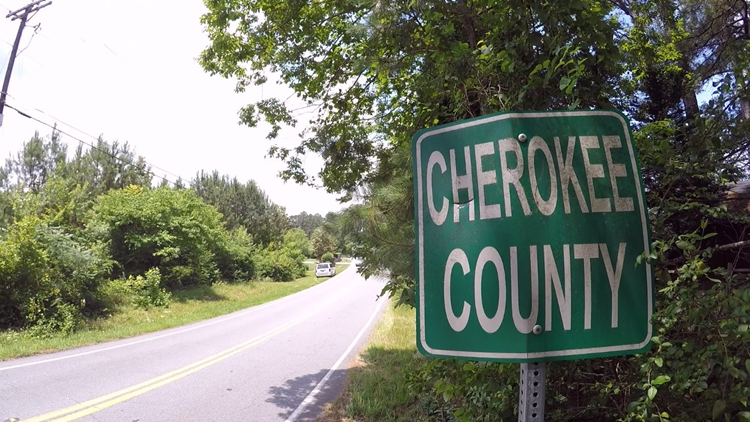In the Foxhall subdivision, the yards are well kept, the flowers blooming and the golf course is never far away. But homeowners aren’t happy.
“Things just don’t seem to make sense,” explained Carolyn Edwards.
That’s because while subdivisions traditionally are built to stop when they hit a county line, the developers of Foxhall built right over it. Carolyn Edwards lives in Cherokee County.
Investigator Rebecca Lindstrom stood on her front lawn and jokingly asked, “How long would it take for you to get to Fulton County?” Edwards laughed a little and said, “Two seconds. Right behind you, about 50 feet away.”
If Edwards were to walk that 50 feet, she would not only cross into Fulton County but also into her neighbor’s yard.
Fulton Tax Revolt | Full coverage of Fulton property tax increase
While the houses in Foxhall may have been built by the same people, at the same time, the property assessments are often very different.
Perhaps it’s most on cul-de-sacs where one side is Cherokee County and the other Fulton. Lindstrom reviewed assessment data and found on the Cherokee side the value of properties went down about 1 percent. On the Fulton County side of the same street, property values shot up by as much as 15 percent.
“There shouldn’t be a difference,” said Kirstie Getch, who lives on the Fulton County side. Yet Getch says when she saw her bill there was a big one, at least financially.
“You’re talking about different school districts, I believe the houses on the other side are in Roswell, so there’s a city. They’re not in a city on the Cherokee side. That can all play a part in the market,” explained chief tax assessor Steve Swindell.
Lindstrom sat down with Swindell to get a better understanding why the home values were assessed differently.
“It’s all numbers to us. We’re just interested in the numbers, the ratios,” said Swindell.
Swindell says those numbers are primarily real estate sales. Each year they review the houses sold and how those prices compare to the county’s assessments. Adjustments are made accordingly. Swindell says they visit each sold property in person to make sure the data about it is correct, but they also try to visit every property in the county once every three to four years.
Cherokee makes adjustments every year based on market data, so the variations may not seem as great as in Fulton, where many properties haven’t seen assessment adjustments in three years.
Swindell says his team only looks at the sales on his side of the county line. So that’s what Lindstrom did to analyze whether there really did exist a difference in values, at least on paper.
While the average home sold last year on both sides of the subdivision was a five bedroom, four and a half bath built in the mid-1990’s, the average price in Cherokee County was $383,000. That’s up $20,000 from the year before. But in Fulton, the average home sale was up $62,000, for a total value of $463,000.
It’s good news for residents in Fulton who want to sell their home, but perhaps financially tough for a family trying to balance the bills as one unexpectedly rises. The county defends its assessment, however, noting that while sale prices in the neighborhood increased 30 percent since 2013, the last year major assessment changes were made, the new tax valuations only went up on average 11 percent.
Getch says she and her husband originally tried to build on the Cherokee County side but there were no more lots available. Once they started having kids, they were glad things worked out the way they did. Between the two counties, Getch prefers the Fulton County Schools.
Lindstrom found that to be the main factor for all of the families she spoke with on the Fulton County side of the subdivision. Those living in Cherokee say they were drawn to the lower taxes.
Even then, Jeff Rahn says he’s a bit upset his tax valuation went down.
“That means there’s less equity in your home if you want to sell,” he explained. “So bottom line, what you’re saying is not matter what your assessment was, nobody’s really happy?” asked Lindstrom. “Exactly,” Rahn said with a smile.
In Cherokee County, Swindell says about 85 percent of property owners did see their assessment increase, especially in rural areas. While the tax digest went up 4 percent, the impact to up individual homeowners was anywhere from zero to 15 percent.


